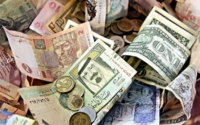What drove Trump’s tweeting tendencies?
Article by Anya Syed.
Trump’s presidency saw no more precarious relationship than the president himself and Twitter. Trump’s tweets delivered global headlines, his daily disputes, and gave insight into his emotions. Analyses by the Lowe Institute investigated the potential reasons why one day saw more insulting Tweets than another. Was there more than rage driving his insulting Tweets? To answer this question, we ran several regression analyses to determine if the stock market, Trump’s personal stock picks, or Dollar to Yuan exchange rate influenced Trump’s tweeting behavior.
To begin investigating, we analyzed different economic reasons for Trump’s tweets from October 2014 to January 2021. Using autoregressive time series regression models, we evaluated Dow Jones returns on day t-1 and Trump’s personal Tweets on day t, yielding no correlation. We then looked at Trump’s personal stock portfolio, evaluating whether the number of insulting Tweets increased as a result of his personal stock performance on the previous day. The Apple and Pepsi stocks resulted in no correlation. However, when regressing Trump’s tweets on the lagged value of the Dollar to Yuan exchange rate, there was statistical significance.
Next, we considered a more robust specification, regressing the number of Trump’s insulting tweets delivered on day t on values for the Dow Jones returns, Apple returns, and the Dollar to Yuan exchange rate on day t-1. We also controlled for lagged values of the number of tweets to capture trends in the series. As covariants, Dow Jones and Apple returns confirmed the prior results, as the Dollar to Yuan results still came through strongly.
The graph above depicts the number of Trump’s daily Twitter insults and the daily Dollar to Yuan exchange rate from 2014-2020. The time series graph depicts the ebbs and flows of daily exchange rate and how this overlays on Trump’s tweets.
Based on the regression results, as the dollar became stronger relative to the Yuan, Trump’s twitter insults increased. Since Trump’s foreign policy initiatives were “America first” and in favor of home-grown manufacturing, perhaps he became frustrated when the Chinese options appeared cheaper and more attractive for producers, with his anger manifesting in more insulting tweets. A strong dollar may incentivize manufacturers to move their operations abroad, thus causing a misalignment with Trump’s desire to put America at the forefront of production and manufacturing.
Despite these results being statistically significant, we would be remiss not to mention that there are several other variables that contribute to Trump’s tweeting. Towards the end of his tenure, Trump tweeted more often, most likely a result of his increasing anxiety with the upcoming election. Therefore, these statistically significant results are fascinating, but other variables must still be considered.


